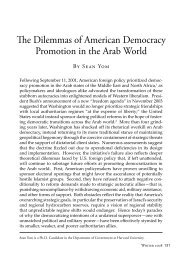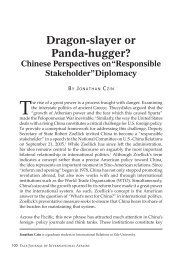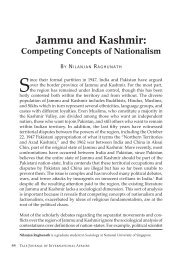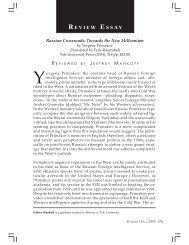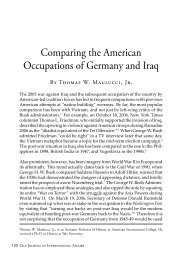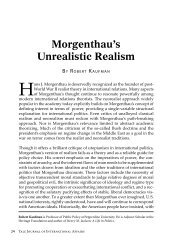Women and the Global Economy - Yale Journal of International Affairs
Women and the Global Economy - Yale Journal of International Affairs
Women and the Global Economy - Yale Journal of International Affairs
Create successful ePaper yourself
Turn your PDF publications into a flip-book with our unique Google optimized e-Paper software.
WOMEN AND THE GLOBAL ECONOMY<br />
Fourth, companies should not shy away from taking on thorny issues. Although<br />
corporations underst<strong>and</strong>ably resist being associated with controversy, <strong>the</strong>y do have an<br />
interest in engaging in sensitive topics such as child marriage <strong>and</strong> women’s access to<br />
reproductive health care (runaway population growth can strain resources <strong>and</strong> threaten<br />
a country’s stability) <strong>and</strong> domestic violence (<strong>the</strong> lost productivity <strong>of</strong> both men <strong>and</strong><br />
women in <strong>the</strong> aftermath <strong>of</strong> domestic violence is enormous).<br />
Fifth, corporations should not try to reinvent methods that have already been perfected<br />
by o<strong>the</strong>rs simply to appear innovative <strong>and</strong> committed. Instead, <strong>the</strong>y should look to<br />
partner with <strong>the</strong> many excellent nonpr<strong>of</strong>it organizations that have been working on<br />
issues <strong>of</strong> women’s empowerment for decades. Organizations such as CARE, Vital Voices,<br />
<strong>and</strong> <strong>Women</strong>’s World Banking are eager to work with <strong>the</strong> private sector to develop<br />
programs that can take advantage <strong>of</strong> corporations’ expertise <strong>and</strong> assets, including<br />
<strong>the</strong>ir br<strong>and</strong>s, employees, supplier bases, technology, <strong>and</strong> funding. Nike, Walmart,<br />
<strong>and</strong> ExxonMobil have formed a number <strong>of</strong> such partnerships. Likewise, Goldman<br />
Sachs is working with more than seventy academic institutions <strong>and</strong> nongovernmental<br />
organizations around <strong>the</strong> world to develop its 10,000 <strong>Women</strong> initiative.<br />
Closing <strong>the</strong> gender gap <strong>and</strong> improving women’s rights in <strong>the</strong> Middle East, South Asia,<br />
<strong>and</strong> sub-Saharan Africa may take many generations, but <strong>the</strong> benefits will be huge—<br />
not only for <strong>the</strong> individual women <strong>and</strong> <strong>the</strong>ir families but also for global markets. As<br />
companies seek new sources <strong>of</strong> revenue in emerging economies, <strong>the</strong>y will find that<br />
gender disparities pose an obstacle to doing business. The sooner <strong>the</strong> private sector<br />
works to overcome gender inequality, <strong>the</strong> better <strong>of</strong>f <strong>the</strong> world—<strong>and</strong> companies’ own<br />
bottom lines—will be. •Y<br />
– Deborah Gim <strong>and</strong> Suchitra Vijayan served as lead editors <strong>of</strong> this article.<br />
NOTES<br />
1<br />
DeAnne Aguirre <strong>and</strong> Karim Sabbagh, “The Third Billion,” Strategy <strong>and</strong> Business 59 (Summer 2010): 1-2.<br />
2<br />
Ibid.<br />
3<br />
McKinsey & Company, “The Business <strong>of</strong> Empowering <strong>Women</strong>” (May 2009): 5, http://www.mckinsey.com/App_Media/<br />
Reports/SSO/Emp<strong>Women</strong>_USA4_Letter.pdf (accessed November 10, 2010).<br />
4<br />
McKinsey & Company, “Business <strong>of</strong> Empowering <strong>Women</strong>,” 8. In McKinsey’s survey <strong>of</strong> 2,300 private-sector executives,<br />
34 percent <strong>of</strong> respondents reported increased pr<strong>of</strong>its, <strong>and</strong> 38 percent <strong>the</strong> expectation <strong>of</strong> increased pr<strong>of</strong>its, as a result <strong>of</strong><br />
<strong>the</strong>ir companies’ efforts to empower women in developing countries <strong>and</strong> emerging markets.<br />
5<br />
“Case Studies: Promoting <strong>Women</strong>’s Economic Empowerment: The Learning Journey <strong>of</strong> Tupperware Br<strong>and</strong>s Corporation,”<br />
World Bank <strong>Global</strong> Private Sector Leaders Forum, http://pslforum.worldbankgroup.org/casestudies/tupperware/index.<br />
aspx (accessed September 14, 2010).<br />
6<br />
“About Us,” St<strong>and</strong>ard Chartered Bank, http://www.st<strong>and</strong>ardchartered.com/about-us/en/index.html (accessed July 12,<br />
2010).<br />
7<br />
“Sustainable Finance: Environmental Finance,” St<strong>and</strong>ard Chartered Bank, http://www.st<strong>and</strong>ardchartered.com/<br />
sustainability/sustainable-finance/enviro-finance/en/index.html (accessed July 12, 2010).<br />
8<br />
“Sustainability: Access to Financial Services,” St<strong>and</strong>ard Chartered Bank, http://www.st<strong>and</strong>ardchartered.com/sustainability/<br />
access-to-financial-services/en/index.html (accessed July 12, 2010).<br />
9<br />
Michael Shtender-Auerbach (Vice President for Social Risk Consulting, Control Risks), interview by Isobel Coleman,<br />
January 12, 2010, Council on Foreign Relations, New York, NY.<br />
10<br />
William Foote (Founder <strong>and</strong> CEO, Root Capital), interview by Isobel Coleman, July 22, 2010, New York, NY.<br />
11<br />
Robert T. Jensen, “Economic Opportunities <strong>and</strong> Gender Differences in Human Capital: Experimental Evidence from<br />
India” (working paper, National Bureau <strong>of</strong> Economic Research, 2010): 6-9, 15-18.<br />
Winter 2011 31



